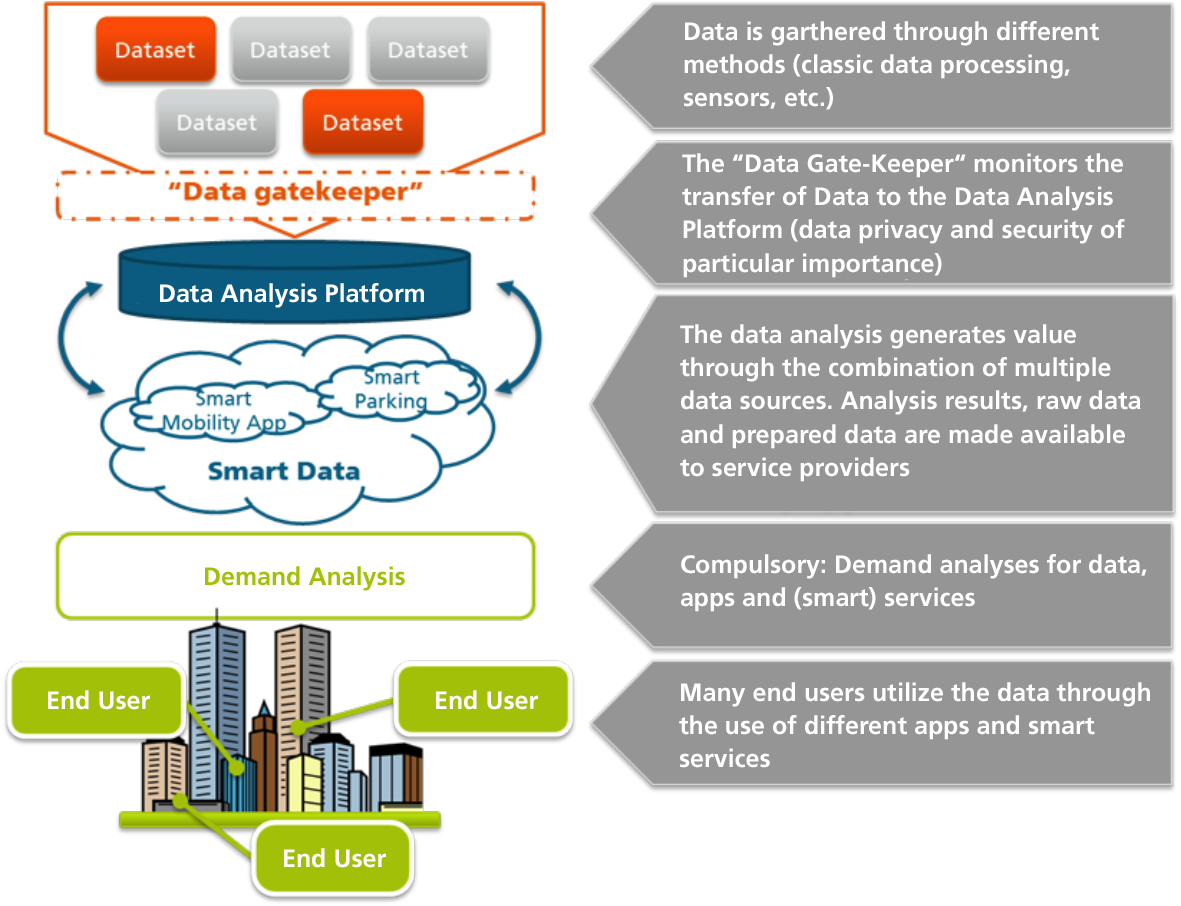
Urban Data Platform

Transparency and participation through intelligent data use
Due to the benefits of improved transparency and new opportunities for citizens and stakeholders engagement, the provision of urban-related data for citizens and local businesses has been identified as an important tool for leveraging sustainable urban policy. The technological advances in the area of ICT have led to a growing digitization of cities in recent decades. Digital city data relating to, for example, administrative processes, urban construction projects or energy consumption of buildings is accumulated in large quantities. ICTs offer new potential for the dissemination and proper use of data, while an "Urban Data platform" offers the possibility of digital networking of various ICT solutions in urban areas.
For whom are our Urban Data platforms relevant?
- Public administration (e.g. integrated urban development unit) for performance management
- Companies active in the areas of transport, energy, project development, etc. for smart services and data collection
- IT companies as a solution provider for smart services for data analysis platform and data collection components
- Research partners to promote innovation in the area of integrated system components from data collection and smart services
Structure of the Urban Data Platform
Advantages of the Urban Data platform
Efficiency
Through data-driven decision-making, improved targeting of user groups and new potential for improved automation ICTs can significantly optimize processes.
Major opportunities for new technologies
Integrated ICT solutions can offer completely new approaches to address existing problems. Additionally, previously unknown problems are revealed and new solutions are provided to solve them.
Growing demand
The advancing digitization of cities and regions also coincides with social change. In the last decade, a new "digital" generation of citizens who want new products and solutions that make their daily lives easier has emerged. Both companies and cities are adapting to the proliferation of ICTs and are aligning their products and services to meet the emerging demand.
Modular offer
Cities can also cover specific areas and associated data and services (for example, through focusing on mobility services).
Morgenstadt Partner Solutions
The Morgenstadt system solution "Urban Data-Platform" offers the following subcomponents according to the five levels presented above.
1: Demand analysis
Systematic assessment of the needs of end users in terms of information and services. Cooperative design of services and applications according to the identified needs.
2: Smart Services
Concrete innovative applications and services in the urban context that use specific data and information to address different user groups (such as mobility app, track-my-street, smart-waste app, etc.).
3: Data analysis platform
A data platform capable of combining and analyzing data sets from a wide range of sources. The processed data is then made available for service providers via open interfaces.
4: Data Gatekeeper
To ensure compliance with data protection, the data must be processed and delivered through the analysis platform in accordance with end user´s and data providers´ needs.
5: Data collection
Innovative methods and techniques for gathering data in the urban context for the data analysis platform and preparing smart services.
Reference projects
The EU project SMARTER TOGETHER focuses on the co-creative exchange of knowledge and innovations between European cities to find new solutions for sustainable development of the city of tomorrow. The focus is on the holistic development of energy-efficient districts, promotion of electric mobility, collection and exchange of data for the optimization of the urban system and strengthening of local participation. To this end, solutions are implemented in cooperation with authorities, companies and research institutes in the three "Lighthouse Cities" of Munich, Lyon and Vienna. Results and working approaches are then passed on to the "Follower Cities" of Santiago de Compostela, Venice and Sofia, as well as to the “Observer Cities” of Kiev and Yokohama.
The city of New York is pursuing a multitude of new approaches to capture, evaluate and process urban digital data. The city collects data from a variety of different sectors of urban life and attempts to use these data to steer and improve urban processes. The city works closely with the Center for Urban Science and Progress of New York University to ensure proper handling of data. However, one of the best known examples of the New York data collection has been implemented in cooperation with IBM.
